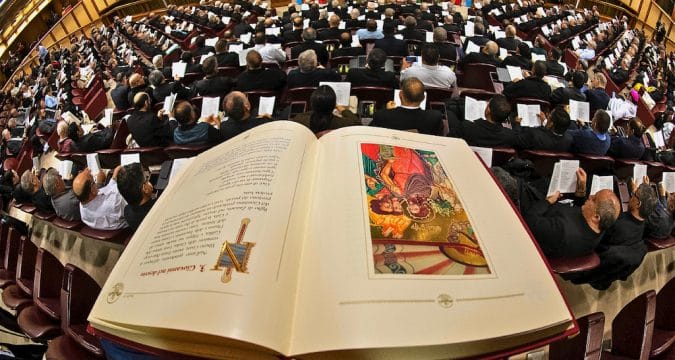
VATICAN CITY (Agencies): The Synod for the Amazon “has four dimensions: The pastoral dimension, the cultural dimension, the social dimension and the ecological dimension. The first, the pastoral dimension, is the essential one, which includes everything,” said Pope Francis in his address to 185 Synod Fathers, on October 6, right after the prayer that opened the first session of the special assembly of the Synod for the Pan-Amazon Region.
Pope Francis went on to elaborate his reasons for convoking the synod and said, “We come to contemplate, understand, serve the peoples; and we do it along a synodal path, we do it in the synod, not in round tables nor conferences or subsequent discussions; we do it in the synod, because a synod is not a parliament, it is not a call centre, it is not showing who has more power over the media and who has more power in the networks in order to impose an idea or plan. The synod is walking together under the inspiration and guidance of the Holy Spirit. The Holy Spirit is the main actor of the Synod. Please, do not kick him out of the room.”
A synod means entering “a process”, one that does not mean occupying a “space” in the room but being wrapped, like children, in the “warmth” of the community and the Mother Church, taking care of the fraternal aspect, the intimacy, using sensitivity and prudence in external communication to avoid any misunderstanding,” said Pope Francis.
Climate change, water resources, inculturation and indigenous practices were among the major topics discussed on the first day of the Synod. A few presentations also focused on the question of ordaining married viri probati, or men of proven virtue, as one possible way to help Catholics access the sacraments in very remote locations.
However, the Vatican press office clarified that, although offering more frequent access to the sacraments where there was a lack of priests was a legitimate need, such a provision could not be part of changing the essential nature of the priesthood and celibacy.
Synod participants offered several proposals to address the lack of priests in the Amazon region, including revising the formation programme for candidates to the priesthood and instituting new ministries for lay men and women. The proposals included discussing the “possibility of diaconal ordination for women, so as to emphasise their ecclesial vocation.”
A different suggestion was to have vocational programmes for young indigenous men in order to promote evangelisation in remote areas so that there would not be “first-class Catholics” who have easy access to the Eucharist and “second-class Catholics” who go without the sacrament, sometimes even for two years at a time.
According to L’Osservatore Romano, the Vatican newspaper, synod members were “struck by the difficult pastoral situations of some dioceses. There are areas, for example, in which the ratio between priests and territories is equivalent to one for every 25,000 square kilometers (9,653 square miles) or where to serve 1,100 villages there are just 45 priests,” the newspaper said.
Synod fathers recalled St. John Paul II’s teachings that Christ is able to reach and “animate” the heart of every culture; some described the Church as being like a complex ecosystem with “wonderful spiritual biodiversity” expressed in so many different communities, cultures, forms of religious life and ministries.










